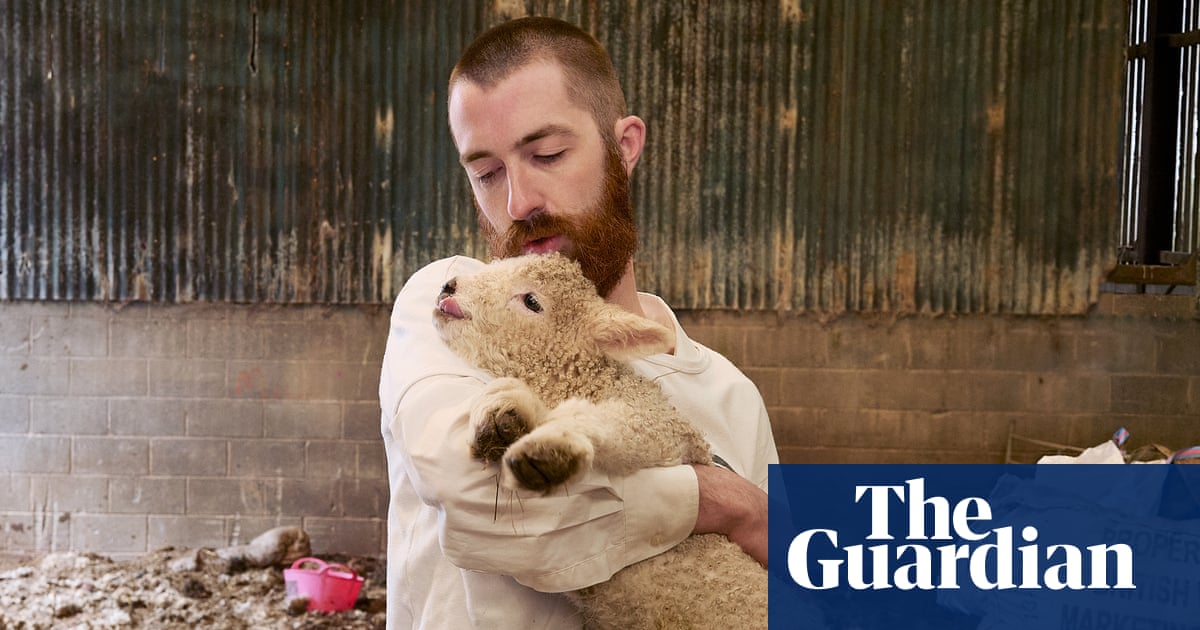The sun is shining, birds are tweeting and a river gently flows just yards away as Jerskin Fendrix tells me about his love of growing up in Shropshire. “It was so gorgeous and majestic,” he says, sitting in the garden of a friend’s house where he spent a lot of time in his youth. “It was nature, forests and hills and then just normal teenage life. The combination of this numinous, big landscape and getting wasted in a cornfield with your mates listening to Kanye West on a Bluetooth speaker while seeing a massive sunset.”
Such vivid scenes fill his latest album, Once Upon a Time … in Shropshire. The opening track, Beth’s Farm, captures an idyllic scene where animals roam and rural teens party. “I thought it was a really nice symbol of this naive innocence,” he says. “Trying to get across how bucolic and heavenly this was before it starts to get corrupted.”
The corruption he speaks of is some recent personal turmoil that has at once intensified, sharpened and darkened the reflective lens he’s looking back through. “A close friend of mine killed himself,” he says. “Then more stuff happened, and more people died.” He wrote about it as a means of dealing with it, along with exploring the complexities and contradictions of grief. “We’re taught by songs or Hollywood films that someone dies and then there’s very slow strings and you cry for six months and it gradually gets better,” he says. “That’s not how it works. Sometimes it’s not as bad as you think, sometimes it’s way worse. It can be trivial, funny or sometimes it’s these massively different combinations at the same time. Death is the same thing as life – it’s as complicated and kaleidoscopically beautiful.”
Once Upon a Time … in Shropshire reflects these vast, knotty emotions. It’s bold and dramatic, heart-wrenching, vulnerable, intimate and funny. From eruptive post-rock to sweeping chamber pop via avant classical explorations, tender ballads and group sing-alongs around the family piano, it’s a singular piece of work.
Joscelin Dent-Pooley was assigned the name Jerskin Fendrix as a joke by a friend at school and it stuck. A trained pianist and violinist, he moved to London in the late 2010s to be in the band Famous, but soon began playing solo shows and collaborating with the likes of Black Midi. His 2020 debut album, Winterreise, touched on hyper-pop, warped electro and leftfield baritone ballads. It was a cult record but it caught the ear of acclaimed film director Yorgos Lanthimos, who has since employed Fendrix to score three films:Poor Things, Kinds of Kindness and the upcoming Bugonia. The former even landed Fendrix an Oscar nomination and he’s buzzing about the next one. “It’s gonna be sick,” he enthuses. “It’s a wild film. I’m very proud of it. We got a 90-piece orchestra, so it’s a big fucking score.”
However, we are deliberately back on home soil to talk about his latest record. Which is not always an easy process. One of the people Fendrix lost during the writing of the record was his father, whose death was sudden and unexpected. Before many of his answers, he takes a long inhale and sits in silence before answering. He tailgates cigarette after cigarette, blazing his way through a pack of Camel Blues.
While the album is rich and joyful, it also contains real pain and anguish. Fendrix stretched his voice to new places, both emotionally and in terms of its register. “I really pushed myself,” he says. “To have gone through so many things that were so unusual, new and testing, and then to make music that was safe and comfortable … it wouldn’t have been reflective.” You can hear on some songs that he is close to breaking. “I wanted to record it myself in my own little studio, and that was fairly brutal for my emotions,” he says. “This was not very long after my father had died, and it was probably a good process, but it was a pretty heavy thing to impose on myself. There are some takes that just felt like self-punishment. I was very isolated, but I always felt people were with me. Having those ghosts there, of the living as well as dead, was almost conversational.”
Experiencing such loss so close to home, Fendrix basked in memories of growing up nestled around a close-knit group of friends and family, being daft, “getting ratted in the kitchen” at parties, and extracting beauty from the simple things you sometimes take for granted. “A lot of people who grow up somewhere remote are like, ‘Oh, it was shit and there was nothing to do’,” he says. “But being bored is fucking great because you invent things. Even if that’s just being a dumbass. One has permission to find their life beautiful and not a lot of people give themselves that, regardless of what your environment is. And that’s not necessarily somewhere idyllic or utopian but just to find a real deep, beautiful meaning in what’s happened to you.”
At the beginning of our conversation, Fendrix said to remind me to ask him about the river in front of us, as it was important. So as our conversation wraps, I bring it up. Another deep breath and long silence. “My friend who died, we had his wake here,” he begins. “And he really loved nature.” With eerie synchronicity, we are now cowering in a corner because the heavens have opened. Fendrix sucks down one last cigarette while looking out at the droplets hitting the flowing stream. “A thing that happened that day really stuck with me: the water came all the way up to here, and the entire town was flooded overnight. It was like the river rose up to come and get him.”
Once Upon a Time … in Shropshire is released via Untitled (Recs) on 10 October
